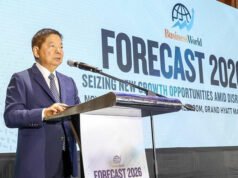Future-proofing Philippines, Inc.
‘Tis the season for job hunting again, so expect the number of job seekers to swell once more. More so this year, as the first batch of 1.5 million senior high school students under the Department of Education’s K to 12 program graduates and joins the work force. It is expected that a number of these senior high graduates will join the work force rather than enter college.
According to the Philippine Statistics Authority (PSA), there were about 2.3 million unemployed workers as of January 2018, of which nearly half belonged to the youth. While the unemployment rate has declined to 5.3% — reportedly the lowest recorded in the past decade — the future remains uncertain for the next generation of Filipino workers.
It’s no longer a secret that there is a job-skills gap gnawing in the country and it has already been gnawing for years. With technology constantly and rapidly evolving, threatening to wipe out repetitive and clerical human tasks, the mismatch could easily reach crisis proportions.
Such a skills gap is not only observed on the incoming batch of hires but even existing employees in an organization.
The Organization for Economic Cooperation and Development (OECD) said by 2020, the Fourth Industrial Revolution would bring us things like AI and machine learning and advanced robotics. However, while these exciting technological innovations — such as self-driving cars and other tech gizmos — do appeal to many as tools for a less stressful lifestyle, their advent may also means transforming existing jobs or making them altogether disappear.
Artificial intelligence (AI) is expected to reshape the workplace of tomorrow. It is actually seen replacing 40,000 to 50,000 low-skilled or process-driven jobs in the business process outsourcing (BPO) sector in the next five years. In the audit industry, AI is doing away with tedious and manual processes that involves paperwork, inventory keeping, and audit reporting. It is also enhancing the identification of accounting fraud and the improvement of audit quality, while machine learning and cognitive computing are improving routine tax compliance, reducing costs, speeding up turnaround, and leading to fewer errors and greater standardization.
With the rise of the machines, the focus on science, technology, engineering and math (STEM) or technical skills around data and technology are definitely crucial, but so are the soft skills. This is also what Google was shocked to find out from its ‘Project Oxygen’ that among the eight most important qualities of its top employees, STEM expertise comes in dead last. Instead, the top seven characteristics of successful employees at Google are all soft skills, such as being a good coach, communicating and listening well, having empathy towards colleagues, being a good critical thinker and problem solver, and being able to make connections across complex ideas.
CEOs need to recognize that upskilling is important because it serves the interest of business. For their work forces to have the needed hard and soft skills, they must have the vision and patience. Recruiting and retaining the right talent is crucial in building a sustainable and successful business.
CEOs must look for ways to collaborate with the academe and the government towards building a strong learning environment and investing in upskilling, re-skilling, and re-tooling workers. There’s a massive potential, too, for public-private partnerships — from internship and apprenticeship programs to technical-vocational training.
To the new graduates, my advice for you is to join an organization that values continuous learning, one that has strong and established programs in on-board new hires. During job interviews, find out if the company provides for the continuing development of employees through training and development activities. Ask if there are opportunities for you to be involved in projects or job roles that will help you acquire new skills. In addition, inquire how the company is using technology and other management tools to help their people perform their jobs better.
To future-proof Philippines, Inc., we must focus on what the most visionary genius Albert Einstein once said: “The measure of intelligence is the ability to change.”
The opinions expressed herein are the views of the writer and do not necessarily reflect the views and opinions of FINEX.
Marivic Espano is the President of the Financial Executives’ Institute of the Philippines (FINEX) and the Chairperson and CEO of Punongbayan & Araullo Grant Thornton, one of the leading Audit, Tax Advisory and Outsourcing firms in the Philippines.
marivic.espano@ph.gt.com



